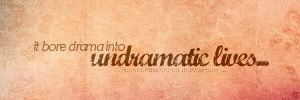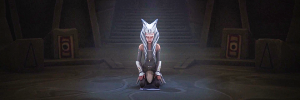#1. "True wisdom is the skill and practice of death." What do you think of this? Is Orual right when she interprets this death as the death of "our passions and desires and vain opinions"?
#2. Why do Orual's attempts at reforming herself fail? Have you ever experienced anything similar?
#3. Does Orual's book really change when she reads it before the gods? Why or why not?
#4.
There should be no gods at all, there's our misery and bitter wrong. There's no room for you and us in the same world. [. . .] We want to be our own.
Orual reads this out of her complaint to the gods, in the bitterness of her selfishness and jealousy for/of Psyche. Is this something our own world struggles with, and fights against? Can we be so caught up in being our own individual person, that we don't want any outer interference?
#5.
The divine nature wounds and perhaps destroys us merely by being what it is
What does Orual mean by this? What has this book's definition of "The Divine Nature" been?

1-2. I think Orual sort of has it right. Her sinful self has to die, but I don't think she really understands what that actually means. She tries to make her sin die by her own will, and of course it doesn't work. She fails because she does not have help. We can't conquer our sin by ourselves. She needs the gods (or God) to work in her, which they already started to do.
3. I don't think it really changes. The words she wrote down aren't there, but their intent remains. She finally reads what has been in her heart all along.
5. I think Orual means that mere mortals are nothing compared to the gods. The Divine Nature as she calls it is so much more and so much bigger than anything human. The definition of the Divine Nature so far has been clouded in darkness and mystery. But I think at this point the veil is starting to lift for Orual and she is realizing that the gods are not necessarily the jealous creatures she thought they were. She thought all of the gods were like Ungit.
1. I think she has it at least somewhat right. She knows that there are things in her nature that need to be gone, her mistake is thinking that she can get rid of them herself. (though not necessarily all desire, just wrong desire.)
2. I think that such an attempt is ultimately destined to fail. We can't be good on our own. I think we've all experienced this at one time or another.
3. Like daughter of the King said, I think that the words she read were the real intent behind her book all along.
4. Yes, I think that that happens in our world. We want to be 'our own', and have no one tell us what to be. Lewis, in The Problem of Pain, says that that was one of the motives behind the Fall.
.They wanted...to 'call their souls their own.' But that is to live a lie, for our souls, are not, in fact, our own.
5. I think she means that the gods and humans are so utterly different, the gods (or God) so far above us, that any contact the lower has with the higher sort of destroys some part of the lower. I don't know how to say this very well. 'The Divine Nature' just seems to be the nature of the gods in general.
The glory of God is man fully alive--St. Iraneus
Salvation is a fire in the midnight of the soul-Switchfoot
#1. "True wisdom is the skill and practice of death." What do you think of this? Is Orual right when she interprets this death as the death of "our passions and desires and vain opinions"?
It sounds odd to me. I don’t think that is exactly what wisdom is. True wisdom comes from God and surrendering to him (which I guess could be considered death.). But that statement doesn’t cover the part of coming from God. I don’t think she has it quite right. Not all passions and desires are bad. The death of selfish desires and passions that don’t put God (or in her case the gods) first would qualify as dying before dying.
#2. Why do Orual's attempts at reforming herself fail? Have you ever experienced anything similar?
She has had a lot of years to get set in her patterns. She isn’t going to be able to change all at once and since her problem is a more internal one she probably won’t be able to change it herself. It is a lot easier to change actions than thoughts, feelings, and emotions. Yes, I have. I have been trying to think more positively and stop (or at least reduce) complaining about people and situations. I’m not making much headway. Although I’m not sure complaining is all bad, sometimes it helps to get things out but I do it way too much.
#3. Does Orual's book really change when she reads it before the gods? Why or why not?
Since we read it in its original form I don’t think it exactly changed. I think it is more that what was behind the words came out. Much of what she said could have been inferred by reading her words (Book I). What she read was what was left of her story after all of her self-delusions were stripped away, much like her clothes were stripped from her.
#4.
There should be no gods at all, there's our misery and bitter wrong. There's no room for you and us in the same world. [. . .] We want to be our own.
Orual reads this out of her complaint to the gods, in the bitterness of her selfishness and jealousy for/of Psyche. Is this something our own world struggles with, and fights against? Can we be so caught up in being our own individual person, that we don't want any outer interference?
Yes, I think our own world struggles with this. Moses didn’t want to lead the people. Jonah didn’t want to go to Nineveh. People tend to want to do their own thing and take advise from no one or accept help. Just to clarify. I don’t think Moses or Johan didn’t want a god they just didn’t want Him to meddle with them.
#5.
Orual wrote:The divine nature wounds and perhaps destroys us merely by being what it is
What does Orual mean by this? What has this book's definition of "The Divine Nature" been?
I think she means it is so good and so powerful that we can’t bear it. Moses would have been destroyed if God had not covered him not because God wanted to kill him but because of what God was and what Moses was. I’m not exactly sure what the definition of “The Divine Nature has been.” I’m rather behind in answering these so I’m having a bit of trouble remembering the details in the first part of the book. I do remember that there have been many definitions of what the gods are like. Orual saw them as out to get her, revengeful, and intent on inflicting misery. Fox didn’t think there were gods at all and that the divine was in everyone. If there were gods, they would be better than what Orual thought. Orual seems to be seeing them differently now. She seems to see them as helpful and trying to teach her and help her.

NW sister to Movie Aristotle & daughter of the King


